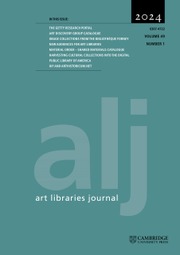I have learned so much while editing this issue of Art Libraries Journal. With library budgets being such that they are, international travel can be an enticing yet unlikely prospect. As I was unable to attend the IFLA Satellite Conference of the Art Libraries Section, I was very excited to be able to work with co-editor Saskia Scheltjens on this special issue and to be able to deliver this content to the many library professionals who may have found themselves similarly situated.
There is some very exciting work being done with data and technology. For example, Rachel McPherson's article, “Disparate Datasets and Data Squishiness: Growing Data Awareness at the National Gallery of Art” describes some of the data being gathered at the National Gallery of Art in Washington D.C. and their efforts to wrangle it. In her article “Collection Data: Sharing, Discovery, Inspiration, and Innovation”, Angela Yon examines more broadly efforts being made across GLAM (galleries, libraries, archives, and museums, or my new favorite acronym) to use a wide array collection data in new and interesting ways.
Hans Brandhorst, in his article “Standardization at Babel--Iconclass at the next level: a laboratory for image research” provides insight into the new version of the Iconclass browser. In their article, “Specialized and Decentralized: Stewardship of the Art Research Collective Collection, Chela Scott Weber, et al. provide an overview of a project examining potential collaboration among art research collections that was done at OCLC. Roosmarijn Ubink, et al. in their article “Preserving cultural narratives: the quest for museum archives in the Netherlands” offer a critical examination of information management among museums in the Netherlands and the creation of the Museum Archives Taskforce.
Thank you so much to my co-editor Saskia Scheltjens and our ever-supportive editor Gustavo Grandal Montero. I hope that readers of ALJ will find this content as fascinating as I did.
A warm welcome to this special issue of the Art Libraries Journal, inspired by the discussions and ideas shared during the IFLA Satellite Conference of the Art Libraries Section held at the Rijksmuseum in Amsterdam in the summer of 2023Footnote 1. Themed Big Ideas, Challenging Questions, the conference provided a forum for art librarians, scholars, and professionals to explore the evolving landscape of art information and data. From discussions on integrating digital technologies into research infrastructures, to examining the stewardship of collections and the communities that they represent, the conference shed light on the hybrid and multifaceted role of art libraries today.
The conference featured two keynotes that did not make it to this issue, but who deserve a special mention because they spring from the same well that inspired the articles that did. The opening keynote was by Sally Chambers from the Ghent University Centre for Digital Humanities, the Royal Library of Belgium, and the European Digital Research Infrastructure for the Arts and Humanities DARIAH, focusing on the importance of large digital research infrastructures where art libraries also have a role to play. The closing keynote was by Tamar Evangelestia-Dougherty, director of the integrated Smithsonian Libraries and Archives, who openly talked about the challenges of the art libraries at the Smithsonian and the possible futures for art libraries in general and the multiple communities of scholarship they serve and bring into dialogue.
This special issue presents a diverse range of papers stemming from the conference. From Rachel McPherson's exploration of data integration at the National Gallery of Art in Washington DC to Angela Yon's examination of the importance of the Collections as Data movement for the GLAM world, each article tackles issues facing art libraries right now. Chela Scott Weber and colleagues emphasize the importance of multi-institutional collaboration for collection stewardship, while Hans Brandhorst advocates for standardized metadata practices in iconographic image research. Additionally, Roosmarijn Ubink and co-authors shed light on the needs of museum archives in the Netherlands, and the strong link they have with art libraries.
All these articles serve as insightful reflections on the challenges and opportunities within art librarianship, reminding us of the significance of collaboration, innovation, and adaptability. And they underscore the words by Tamar Evangelestia-Dougherty, in her inspiring keynote: ‘Narrowly looking at art libraries as singularly serving communities of artists and art historians hinders our ability to bring multiple communities of scholarship into dialogue’. And is not the latter what we as art librarian should be doing now?
I extend my gratitude to the authors for their valuable contributions, to the Associate Editor of this issue, Lindsey Reno, and the Editor, Gustavo Grandal Montero, for their patience, and last but not least to the readers for their engagementFootnote 2. May this issue help to inspire dialogue, collaboration, and transformation within the art library community.


